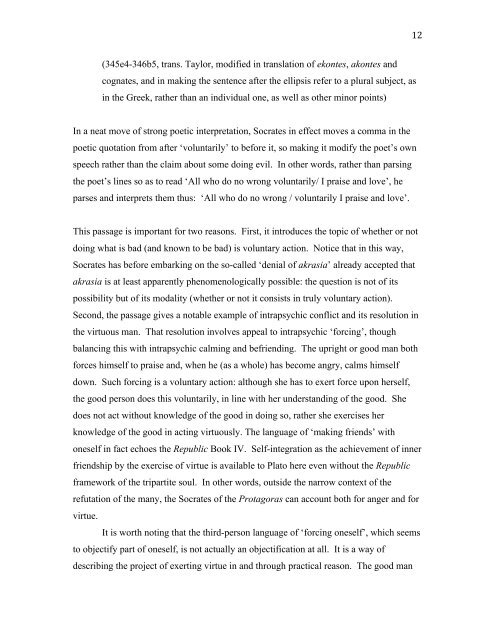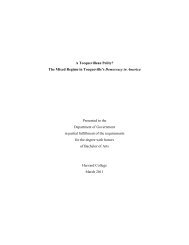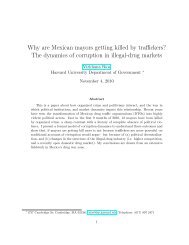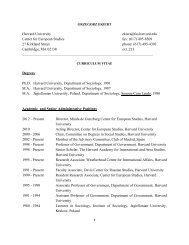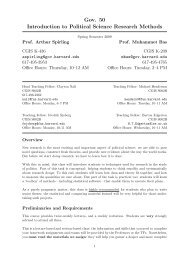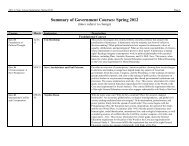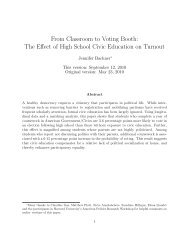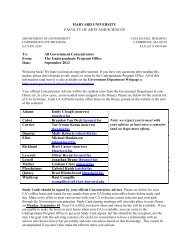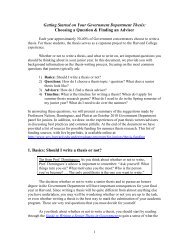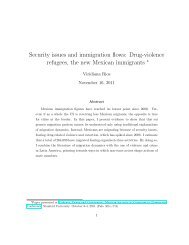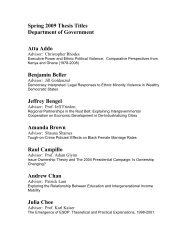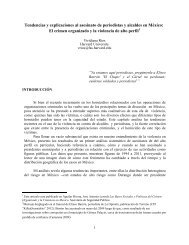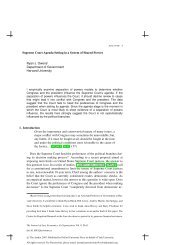1 Harvard University Political Theory Colloquium For 11 March 2010 ...
1 Harvard University Political Theory Colloquium For 11 March 2010 ...
1 Harvard University Political Theory Colloquium For 11 March 2010 ...
Create successful ePaper yourself
Turn your PDF publications into a flip-book with our unique Google optimized e-Paper software.
12 <br />
(345e4-346b5, trans. Taylor, modified in translation of ekontes, akontes and<br />
cognates, and in making the sentence after the ellipsis refer to a plural subject, as<br />
in the Greek, rather than an individual one, as well as other minor points)<br />
In a neat move of strong poetic interpretation, Socrates in effect moves a comma in the<br />
poetic quotation from after ‘voluntarily’ to before it, so making it modify the poet’s own<br />
speech rather than the claim about some doing evil. In other words, rather than parsing<br />
the poet’s lines so as to read ‘All who do no wrong voluntarily/ I praise and love’, he<br />
parses and interprets them thus: ‘All who do no wrong / voluntarily I praise and love’.<br />
This passage is important for two reasons. First, it introduces the topic of whether or not<br />
doing what is bad (and known to be bad) is voluntary action. Notice that in this way,<br />
Socrates has before embarking on the so-called ‘denial of akrasia’ already accepted that<br />
akrasia is at least apparently phenomenologically possible: the question is not of its<br />
possibility but of its modality (whether or not it consists in truly voluntary action).<br />
Second, the passage gives a notable example of intrapsychic conflict and its resolution in<br />
the virtuous man. That resolution involves appeal to intrapsychic ‘forcing’, though<br />
balancing this with intrapsychic calming and befriending. The upright or good man both<br />
forces himself to praise and, when he (as a whole) has become angry, calms himself<br />
down. Such forcing is a voluntary action: although she has to exert force upon herself,<br />
the good person does this voluntarily, in line with her understanding of the good. She<br />
does not act without knowledge of the good in doing so, rather she exercises her<br />
knowledge of the good in acting virtuously. The language of ‘making friends’ with<br />
oneself in fact echoes the Republic Book IV. Self-integration as the achievement of inner<br />
friendship by the exercise of virtue is available to Plato here even without the Republic<br />
framework of the tripartite soul. In other words, outside the narrow context of the<br />
refutation of the many, the Socrates of the Protagoras can account both for anger and for<br />
virtue.<br />
It is worth noting that the third-person language of ‘forcing oneself’, which seems<br />
to objectify part of oneself, is not actually an objectification at all. It is a way of<br />
describing the project of exerting virtue in and through practical reason. The good man


